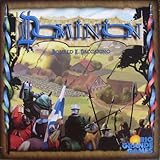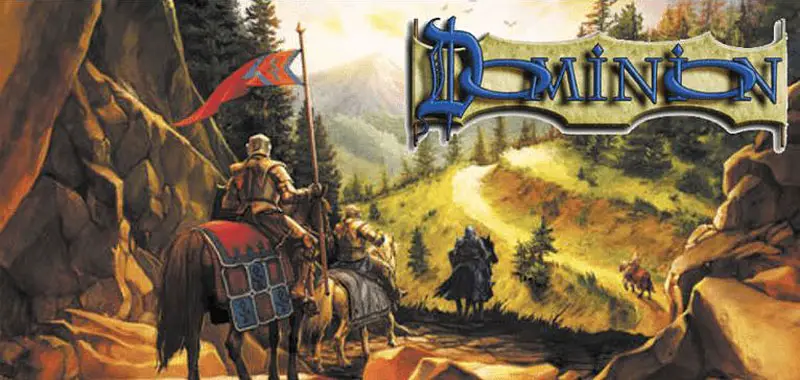
Duration Cards
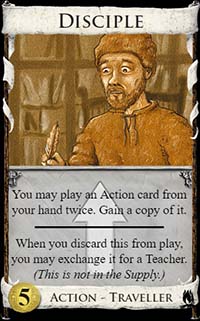
Adventures has Duration cards, previously introduced in Seaside. Duration cards are orange, and have an ability that does something on a future turn. Duration cards are not discarded in Clean-up if they have something left to do; they stay in play until the Clean-up of the last turn that they do something.
Additionally, if a Duration card is played multiple times by a card such as Disciple or Throne Room, that card also stays in play until the Duration card is discarded, to track the fact that the Duration card was played multiple times.
Keep track of whether or not a Duration card was played on the current turn, such as by putting your cards into two lines (older cards and this turn's cards).
Reserve Cards
Adventures has Reserve cards. Reserve cards are tan, and have an ability that puts them on the Tavern mat. Each player has his own Tavern mat.
Most Reserve cards have an ability that "calls" the card. This moves the card into play at a certain time, optionally, and causes it to do something then. Playing a Reserve card does the part of the card's text that's above the dividing line, which includes putting it on the Tavern mat; then it sits on the Tavern mat for as many turns as desired, doing nothing; then it is called into play at the time stated below the dividing line, to do whatever it says.
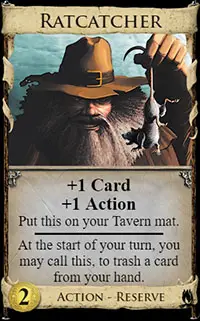
For example Ratcatcher gives +1 Card +1 Action when played, and goes on the Tavern mat; on some future turn, at the start of the turn, the player can move Ratcatcher into play to trash a card from his hand.
Calling a card does not repeat the abilities on the card above the dividing line; that part only happens when the card is played. Reserve cards are discarded during Clean-up normally on the turn they are called. Two Reserve cards are not called; Distant Lands just stays on the mat, while Wine Merchant has a special condition in order to get it off of the mat.
Cards on Tavern mats are not in play, but Reserve cards that have been called this turn are in play. So, for example, Pilgrimage cannot gain copies of cards on the Tavern mat, but can gain copies of Reserve cards called into play the same turn. Cards on Tavern mats are included in decks when scoring at the end.
Calling Reserve cards is not playing an Action, and does not reduce how many Actions the player may play on his turn; for example, a player could start a turn by calling two Ratcatchers, then continue his turn by playing a Ranger from hand.
Playing a Reserve card other than Coin of the Realm is playing an Action and does reduce how many more Actions a player may play that turn, like other Actions.
Event Cards
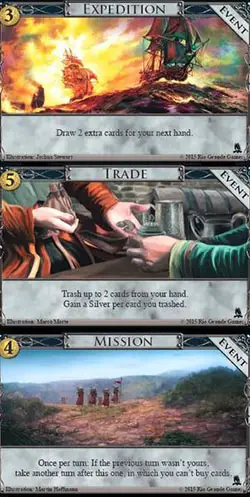
Adventures has Event cards. These are not Kingdom cards. In a player's Buy phase, when the player can buy a card, the player can buy an Event instead. Buying an Event means paying the cost indicated on the Event and then doing the effect of the Event.
The Event just stays on the table, the player does not take it; there is no way for a player to gain one or end up with one in his deck. Buying an Event uses up a Buy; normally a player can either buy a card, or buy an Event.
A player with two Buys, such as after playing Ranger, could buy two cards, or buy two Events, or buy a card and an Event (in either order).
The same Event can be bought multiple times in a turn if the player has the Buys and available to do it. Some Events give +Buys and so let the player buy further cards/Events afterwards.
Players cannot play further Treasures that turn after buying an Event. Buying an Event is not buying a card and so does not trigger cards like Swamp Hag or Goons (from Prosperity). Costs of Events are not affected by cards like Bridge Troll.
Traveller Cards
Adventures has Traveller cards. These cards have an arrow over the text box to remind players of their ability to upgrade into another card.
When a player discards a Traveller from play, he may exchange it for the card indicated; he returns the card being exchanged to its pile, takes the card he is exchanging it for, and puts that card into his discard pile. For example when exchanging Peasant for Soldier, he puts Peasant back into its pile and takes a Soldier and puts it into his discard pile.

Exchanging is not trashing or gaining, and so does not trigger abilities like Travelling Fair's. It is optional. It only happens when the card is discarded from play; discarding it from hand, such as due to not playing it, will not trigger it.
It only happens if the card being exchanged for has any copies available; if there are no Soldiers in the pile, Peasant cannot be exchanged at that time.
If multiple cards do something when discarded from play, the player picks the order; for example, with no Soldiers left in the pile, a player with Peasant and Soldier in play could first exchange Soldier for Fugitive, then exchange Peasant for that Soldier. Page and Peasant are Kingdom cards that are Travellers.

Page is exchanged for Treasure Hunter, which is exchanged for Warrior, which is exchanged for Hero, which is exchanged for Champion; Peasant is exchanged for Soldier, which is exchanged for Fugitive, which is exchanged for Disciple, which is exchanged for Teacher.
Champion and Teacher are not Travellers; they cannot be exchanged for anything. Page and Peasant can be bought or otherwise gained when being used in a game, but the other cards cannot, they are not in the Supply.
When a non-Supply pile is empty, that does not count as an empty pile for the game ending condition or for City (from Prosperity).
Continue Reading
